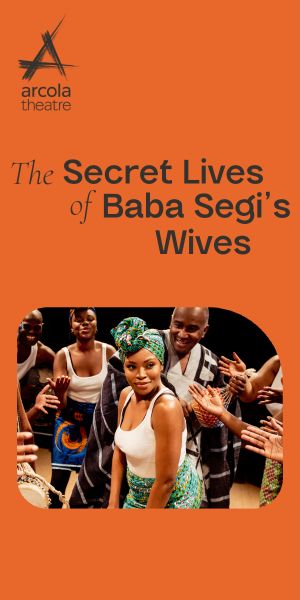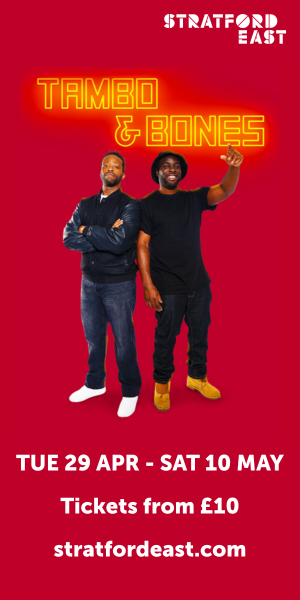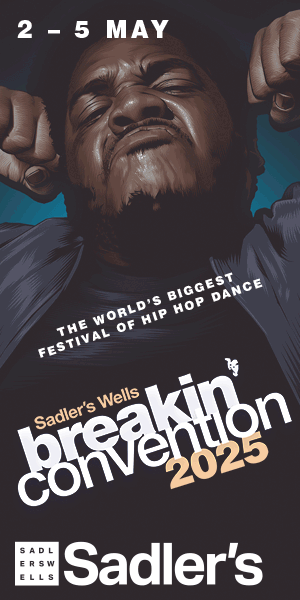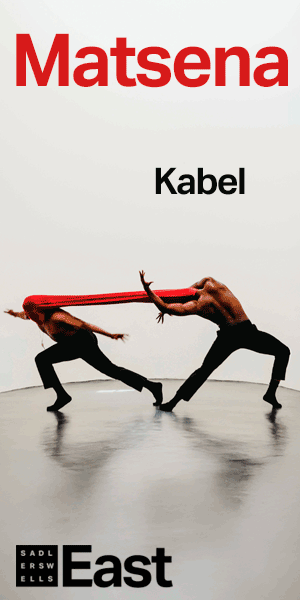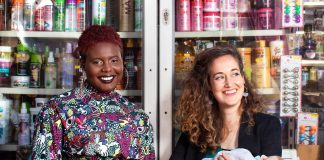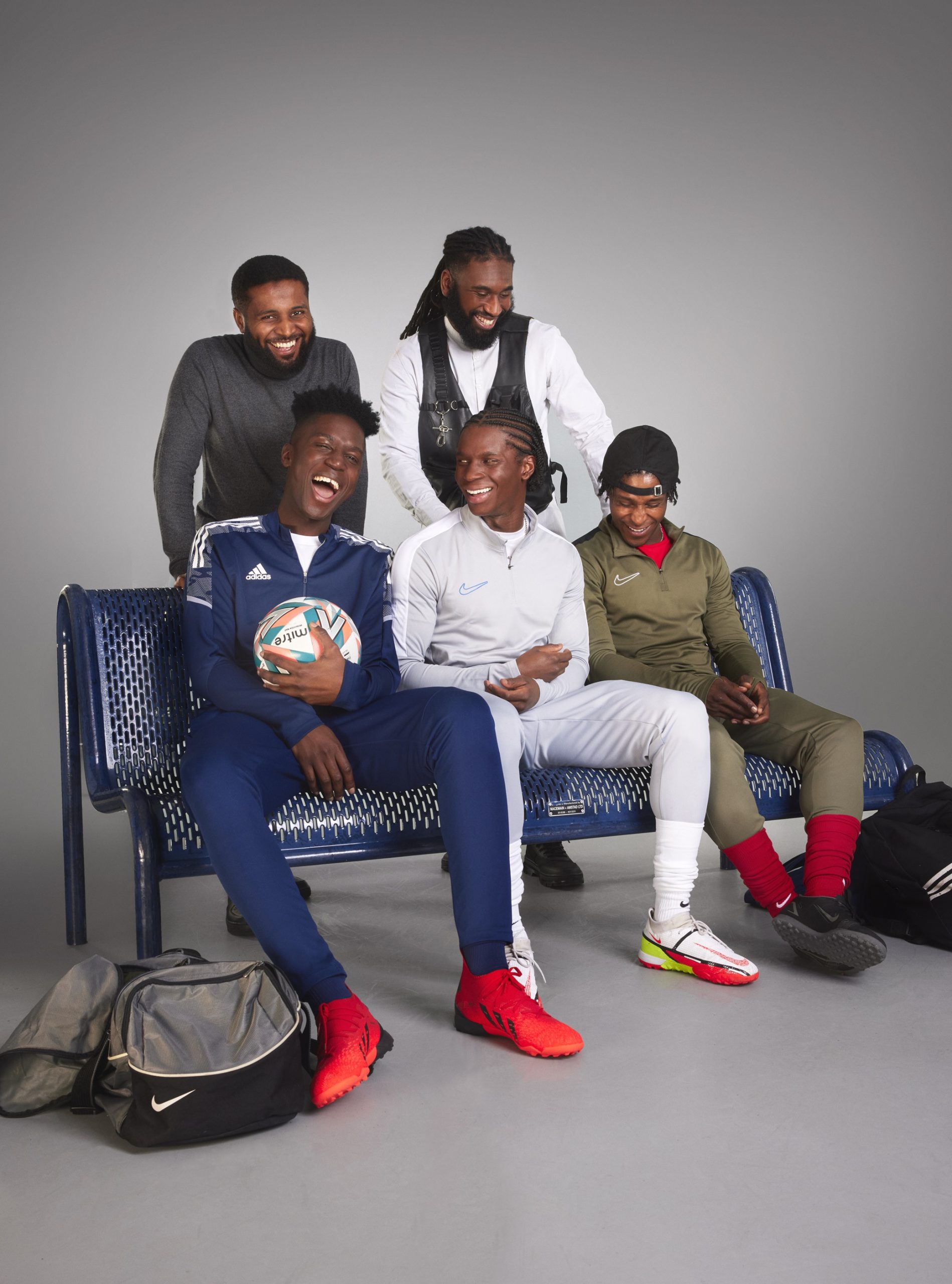
We were over the moon to be invited to an exclusive roundtable with the cast and creatives of Red Pitch during rehearsals for the play’s opening of the west end transfer @sohoplace. From humble beginnings at the Young Harts Writers festival, two sold-out runs at Bush Theatre to the bright lights of the west end, read on for more on theatreland’s newest arrival.
Meet the Creatives:
Daniel Bailey (director), Tyrell Williams (writer), and Khalil Madovi (sound design)
A brief history of Red Pitch…
Hammersmith’s Young Harts Writers Festival
Tyrell Williams: Red Pitch started off as a 10-minute play at the Young Harts Writers Festival and that’s where Daniel (Bailey) and I met officially. The idea came after I saw these houses on top of the football pitch that my friends and I used to play on. The houses were unoccupied and were not being used for the purpose that they were being built. I just felt moved to write something about that. The way the festival works is that you get partnered with a director and three actors and thankfully, I was partnered with Daniel. We had a week to develop it and then the audience vote for their favourite on the day of the performance, and we won audience favourite.
Ovalhouse Theatre’s First Bites Season
A year later (2019), I did Ovalhouse Theatre’s First Bites Season (now Housemates Festival, Brixton House). That was a yearlong programme where you could develop the idea and you have multiple workshops with different practitioners. At the end of the yearlong residency, you can put the scratch performance (now 60 minutes) on for three nights. That was a good experience to open it up and expand on 10 minutes and then lockdown happened. In between lockdown, I was still writing and still developing it – speaking frequently with DB (Daniel Bailey), my agent, going back and forth on the drafts.
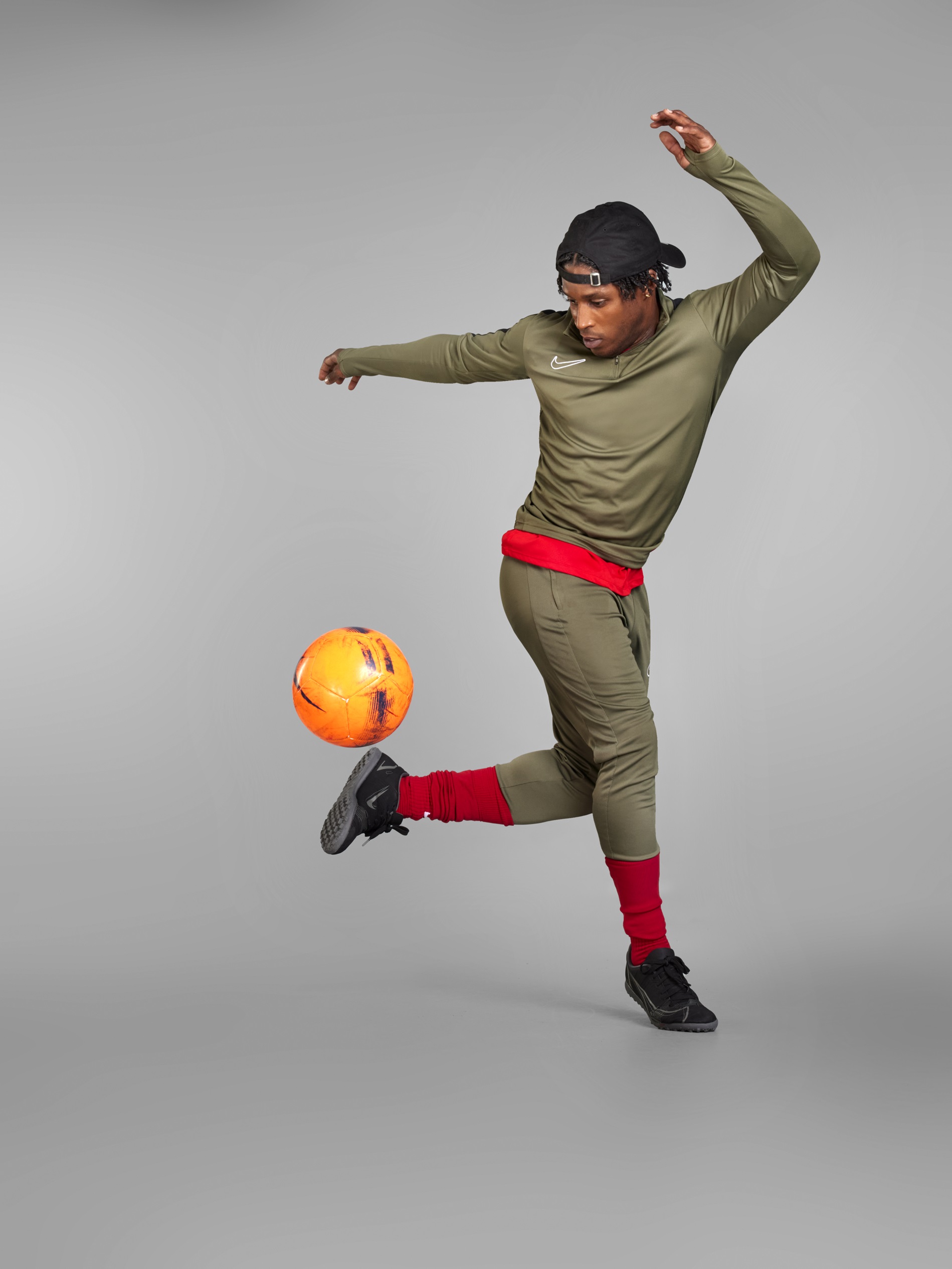
Bush Theatre
I heard the Bush Theatre wanted to hear a reading of it, DB and I spoke about some actors, they came in, read it to Lynette (Lynette Linton, artistic director, Bush Theatre). Shortly afterwards, I heard that the Bush wanted to do it. It still wasn’t ready so there was lots of redrafting, lots of input from the cast, lots of input from DB, then the drama therapist came. That was really useful for me in terms of unlocking the story especially at the end as I’d struggled with the ending for a while… then we just put it on. That was the journey…
On the journey from Bush Theatre to @SohoPlace…
Tyrell Williams: It feels good. It feels exciting. A vivid moment for me was standing on the @SohoTheatre stage for the first time and I remembered everybody who had helped shaped that story – not only the artistic contributors but people I’d grown up with and remembering that this is their story, too and how far their story has travelled. I just want to make sure those people and those audiences, young people as well will come and see it and enjoy it.
Khalil Madovi: From a sound design perspective, it’s been about achieving the balance of maintaining the personality and intimacy of the play whilst also scaling it up for the space. Part of the beauty of how multidimensional this story is are that there are those opportunities like with the dream sequences to really scale up and portray these boys’ dreams and visions. There’s also the superb personal moments of them being on the pitch – whether that’s them training, going through something. So, the biggest difference from a design perspective in that respect has been how we keep the heart and make that bigger.
Daniel Bailey: The Bush Theatre is a very intimate space, and a space that we love, it’s very inventive and allowed us to do so many other things. This space is slightly different in that it’s obviously larger, but for us, it really is about us being able to transport the heart of the piece, and bring the Endz to the West End. A lot of the conversations we’ve had has been about how do we bring that into this space that feels commercial but still without us compromising on the essence on the play. So as much as we are scaling up, we are very adamant that what we’ve created and produced, is very much still the early fabric of what we present.
Daniel Bailey: We’ve worked really hard and are continuing to work hard to look at audiences that were at the Bush will be here at Soho Place and are welcome here. When we started in 2018, the brilliant thing we understood in that moment was the audience. At the heart of the play is that the community voted for it towin the Young Harts Festival, to Ovalhouse First Bites festival, and that followed it again to the Bush and will probably still follow it again to Soho Place. It’s created its own community, and that community will be here for sure and we’ve made demands on that, so we don’t lose that community. But the capacity has increased by at least three times what it was at the Bush so there is going to be a whole new community that come and see it. They might not have directly experienced every single thing that these boys have but there are those universal themes, and we are hoping people will learn and reflect on themselves and their own journeys.
Khalil Madovi: There are some things that transcend cultural barriers – even if you might not understand every line.
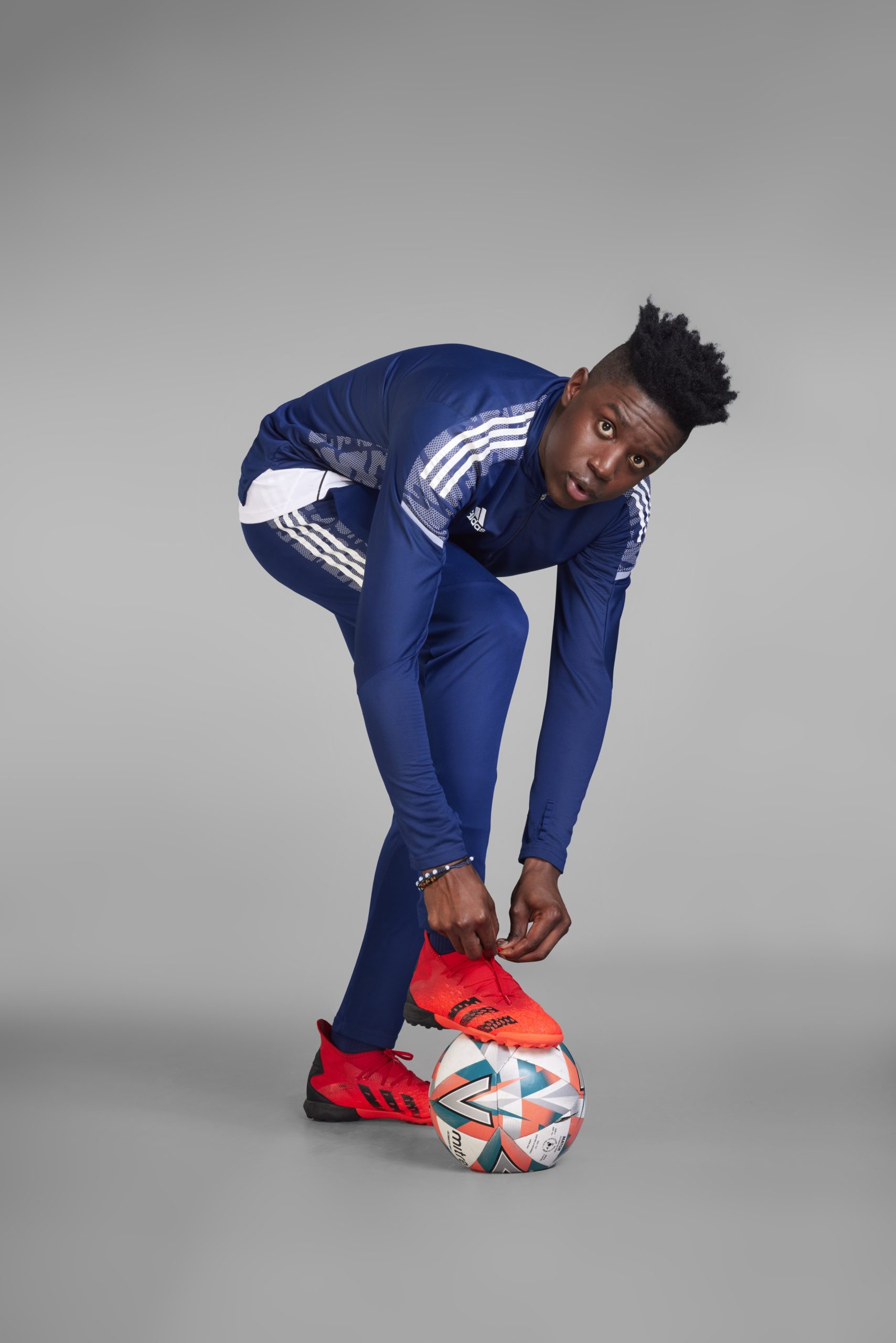
The director’s journey…
Daniel Bailey: The journey is slightly different for me as the director. You (Tyrell) did a lot of that legwork. What we don’t always talk about is your belief in the script that you had, the resilience and the persistence. You just had a fire in your stomach from the moment you started because of what you saw with the football pitch and that’s stuck with you, throughout. Even during lockdown, (laughs) I wasn’t thinking about Red Pitch, honestly. Tyrell was just sending me all these versions – I didn’t even know if I wanted to read another play. But I had such an affinity to it and I such an obligation to Tyrell because of that tenacity, which made me pay attention and refocus. Lynette and I were doing a lot of work during lockdown then two years later, you were back with the ending so it’s slightly different from a producer/director point of view. It was four years in the making at this point.
Red Pitch means the world to me – not just because we’re in the West End but because we’re achieving something with the team. We’re doing the thing that we set out to do from the get go. Tyrell had this story and he was adamant that he wanted to tell this story and there was a reason why and that has been our driving force. It doesn’t matter if we’re in a corner in south London, or a corner of west London – big up Brixton House – Ovalhouse at the time and Bush, which is my home or if we’re in the west end or halfway across the world which I’m sure will happen. I feel extremely proud of it no matter where it goes. It feels like we’ve raised it like our own baby. I commend Tyrell for writing it but I’m also humbled to be a part of its journey and it’s legacy.
I’m extremely excited by what we’ve got coming up and how far we’ve come and all the different journeys. I’m also in the mode of knowing that it doesn’t stop here – it continues to grow, and the legacy will outdate us and surpass what we do here. There will be young people that watch it and it will be the spark for them and there will be families that watch it in 10 years’ time and will be like, ‘oh my gosh’ and in 30 years’ time it will be the foundation and the bedrock of the stuff that you continue to do Tyrell. There are so many people that have formed a relationship with it and a career out of it that is the true legacy of it. It is in itself, the good ancestor. It just keeps on giving.
Tyrell Williams: Daniel and I have a really good relationship. We’ve developed a real friendship and I consider him to be one of my brothers. He has come from a similar background to what I’ve come from so there’s that shared experience, so it’s been so much easier to communicate so he’s contributed as a director but as a dramaturg as well. It’s been very useful to be working with Daniel.
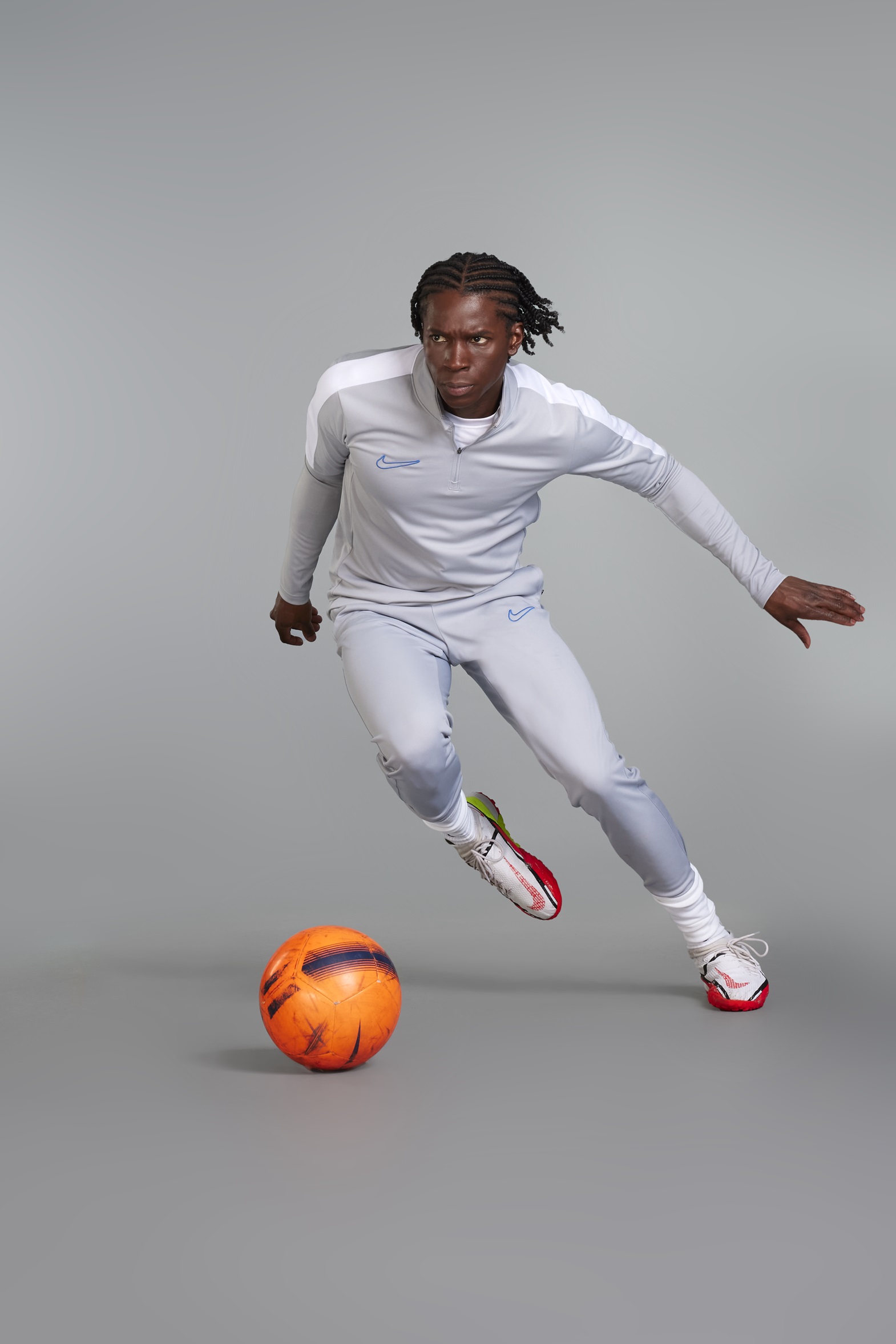
On welcoming new audiences…
Tyrell Williams: I hope they learn something. I hope there’s something in there for them to learn. I would like to throw community in there and the importance of having a community and finding your tribe and what happens when that comes under threat. I want audiences to have that question in their mind. And, to understand the human experience of others and be able to have a nuanced understanding. There’s some things that transcend cultural barriers – we’re talking about family, friendship and love. Making sure the audience is diverse is a huge priority for us. I want young people to come as well because I think representation is incredibly important.
Daniel Bailey: We’ve worked really hard, and we are continuing to work hard to make sure the audiences that were at the Bush, will be here @SohoPlace and are welcome here. From 2018, at the heart of the play again is the community who voted for Red Pitch to win and that same community that followed it from Young Hearts festival at the Lyric, to Ovalhouse and followed it again to the Bush and probably still to @SohoPlace.
It’s really created its own community and that community will be here for sure and we’ve made demands on that. But the capacity has increased by at least three times what it was the Bush so there is going to be a whole new community that comes to see that might not have directly experienced every single thing that these boys have experienced but again there are those universal themes that will bring people in. And, that they get to learn, experience and reflect upon themselves and their own journeys and connect to the themes of the play.
We have to be honest; we have four wonderful producers now who are doing what they can to learn what it is this play needs to be in the west end. They’ve got an obligation to sell tickets and we want this play to be successful and some of that work falls upon us just because we have those connections, and it is slightly easier for us to do some of that outreach work. Tyrell and I were youth workers before so that’s something else that we bring into it. This venue is still learning because it’s brand new and so the audience that they have as a core is going to change and start to shift and this is part of that process and the change in what this venue can do and should be doing to bring in more people from the communities we come from.
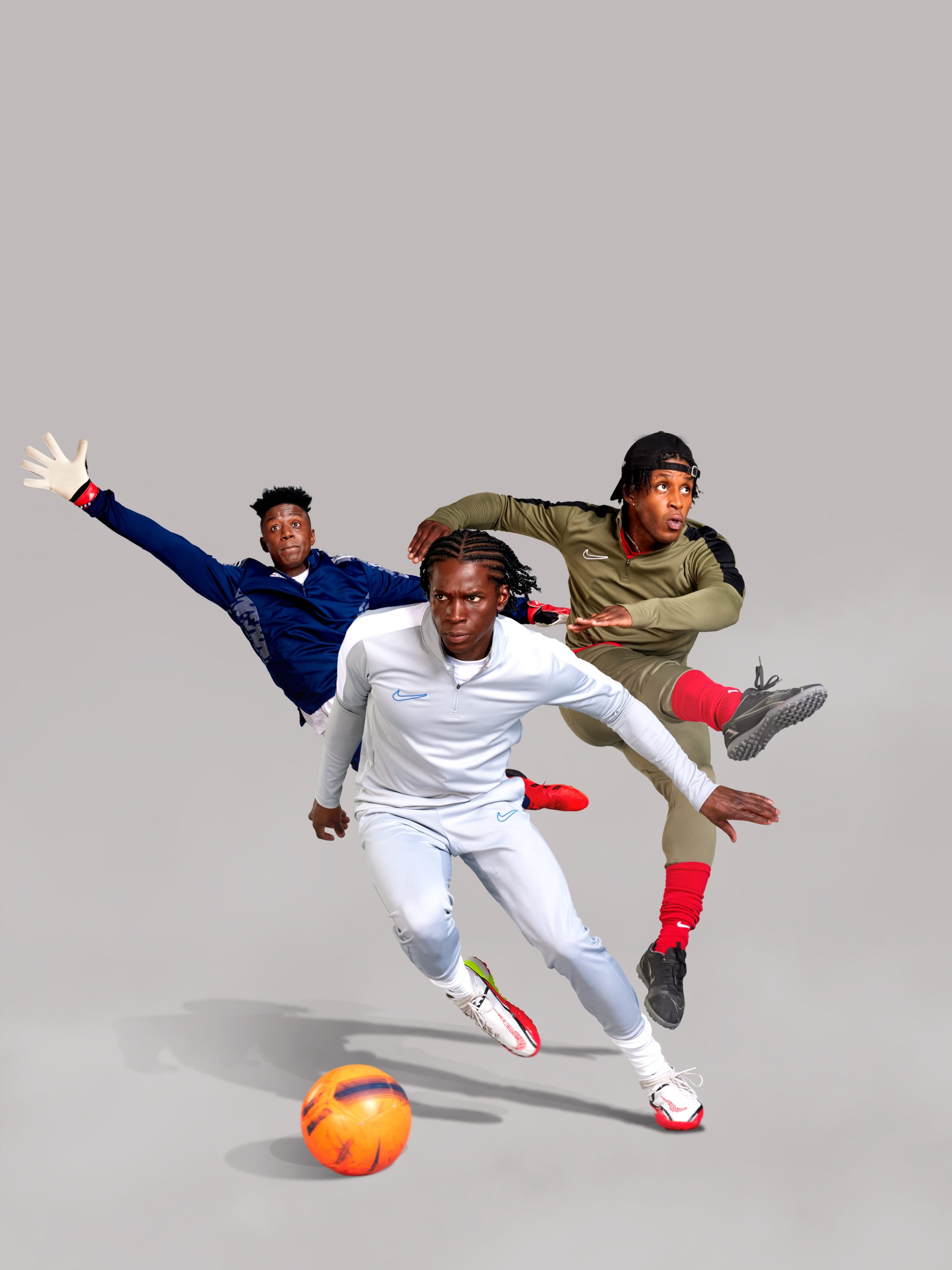
On bringing the original audience to the West End…
Khalil Madovi: It will still be the same story, same heart, same essence but it’s not going to the feel the same but the scale of it is different in a way where the push and pull is different, things will be more intense, land differently. The journey of the story still follows the same trajectory but it’s not going to feel like the same ride. If I was an audience that loved the play, I’d be running to come and see how it will feel here because it’s not another version of it, but it is another version of it, and I think that’s a very beautiful thing.
The importance of sound and Red Pitch
Khalil Madovi: Music is at the core of Red Pitch – the core of our culture and the core of who we are. So, when we speak of authenticity, that’s definitely a big part of it as well. In terms of the play structurally, we have great opportunities to reflect other parts of the experience in abstract ways. When we have certain scenes and transitions, we can jump into more surreal worlds that can allow us to use music as a tool to reflect other things that the rules of a naturalist world don’t allow.
When we’re on the estate, we’re very much on and in the estate, we feel and hear and smell the estate, it’s important than when we depart from those moments and we go into the internal minds of these young boys, everything that has made them has to be felt and for me that’s one of the times where music holds its strength and it’s power in terms of being a storytelling device. I think part of what excites me about that happening is that it might do a different thing within the story for people who don’t necessarily come from the same cultural context as we do but don’t necessarily have the same types of relationships with what it is to survive with music.
Daniel Bailey: I want to just talk on the brilliance of Khalil. We’ve been collaborating for a number of years but I kid you not, year on year, he exceeds in his art, composition wise, and his understanding of the world and what he brings to each bit of storytelling is music. I’m surprised but also not surprised at how brilliant he is and how unwavering he is with the commitment that he has to the play. He just evolves and allows us to evolve and so musically, the stuff that he’s bought and created this time around, is just on another level.
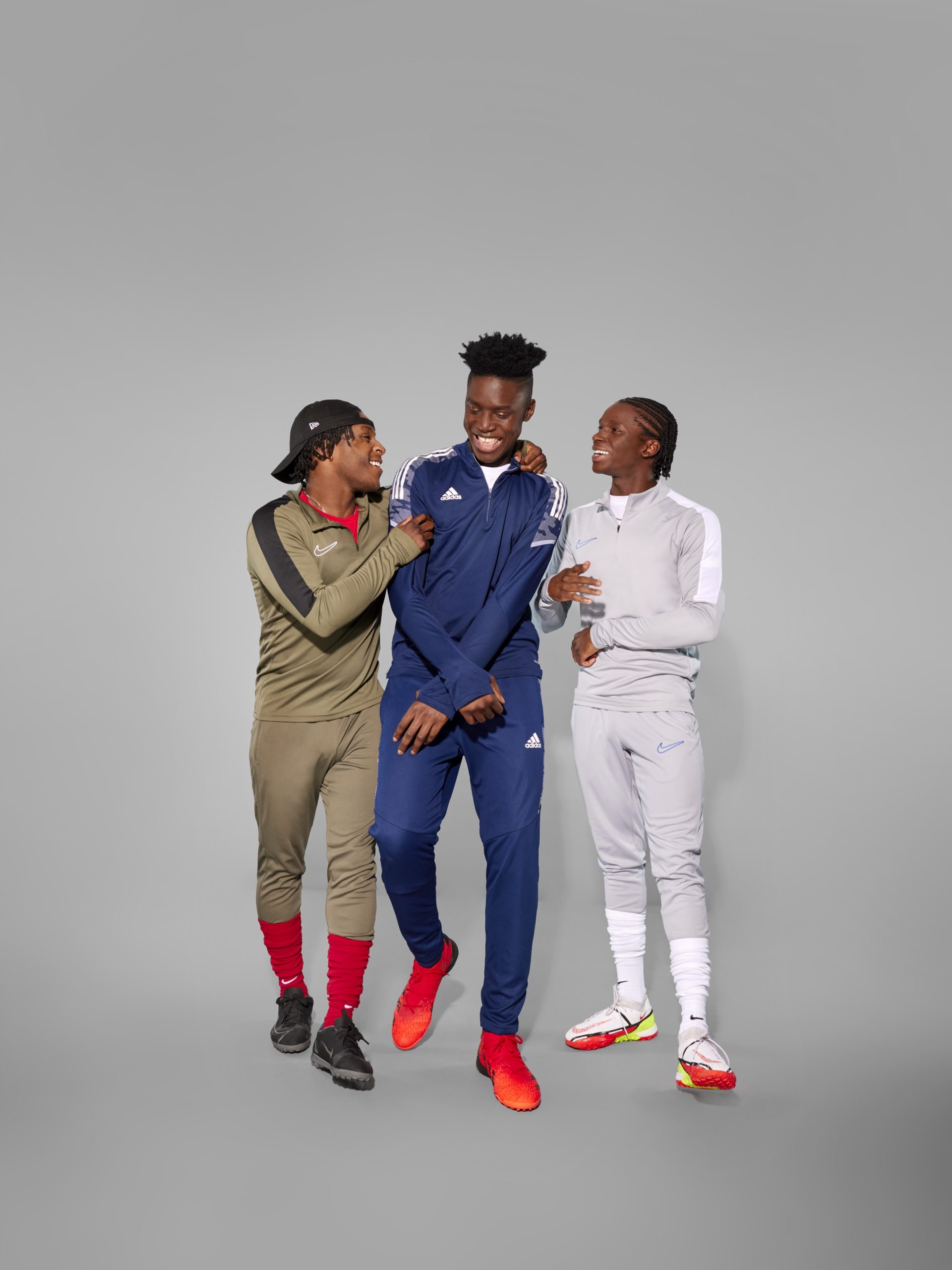
Meet the cast:
Kedar Williams-Stirling, Emeka Sesay and Francis Lovehall
Immediate thoughts on getting the call that Red Pitch was getting a west end transfer
“Damn right”
“Wasn’t surprised at all. It was a matter of time. We knew it was coming”.
Do you feel that there’s more pressure on the show being in the west end than at the Bush?
“No because the team are with us”
“I felt there was more pressure at the Bush knowing the community that it holds. The west end is huge of course but now we’re in a space where we need to represent what is coming here. I don’t feel like there’s pressure.”
“We’re grateful that we get to share it with a bigger audience.”
“A knock-on effect of the pressure is the expectation but really, we don’t need to prove anything. As it’s a solid piece within itself. If anything, we’re keen to explore what else we can find in the text rather than any pressure that we’re here.”
Emeka Sesay on playing Joey
“I love Joey because of the power of how innocent he is as an individual and how he cares about his friends, and how ahead he is in turns of like understanding what’s happening to the world in terms of gentrification, and he is someone that cares about his community. He’s so different to me and my character, I like how my character makes me feel in terms of being grounded and very caring. I think since doing the play I’m very much more of an open book a bit more and being able to communicate better which I feel Joey does. Every time I get to play Joey it’s like a beautiful moment because I like how it makes me feel before and after I’ve done the show.
Kedar Williams-Stirling on playing Bilal
“I guess the way I resonate with my character is through his relationships with his friends as I have close relationships with my friends – male and female and I’ve grown up with them for quite a while and the impact Joey and Omz have on Bilal is definitely something I resonate with in terms of the way my friends have impacted and inspired me. I’d say the challenging thing is how good he is at football (laughs)l. I think naturally growing up not necessarily playing football as much as much as my character is supposed to – that’s probably been the most challenging aspect.
Francis Lovehall on Omz
How I resonate with my character is that I grew up playing football. I was playing at professional level, and it was what I wanted to do for a long time so I feel very close to the character in many ways. I think the personality of Omz is one that I feel that I have gone through, where you’re in an environment where a lot of things can push and pull you. I’m very used to being pulled in different directions.
On working together for the third time…
Emeka Sesay: I literally look forward to seeing them every day. The energy. The excitement and there’s just love in the room. I’m just so grateful and we also support each other dearly and look after one another. I think that’s why I’m most excited by it especially as we’ve got the whole team from Bush to @SohoPlace and we’ve all grown together. There’s times when I think about being another play and I wonder if I’d ever have that again. I’m so blessed to have this.
Kedar Williams-Stirling: It’s interesting as I’ve heard a lot about Companies that don’t get on. We’re magnetic and you attract what you attract and sometimes you just don’t click like that outside of the working space and this just hasn’t been like that. We really are a family.

Tyrell Williams, Francis Lovehall , Khalil Madovi, Kedar Williams-Stirling























